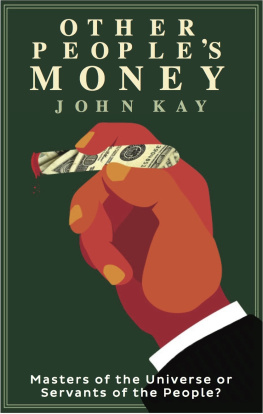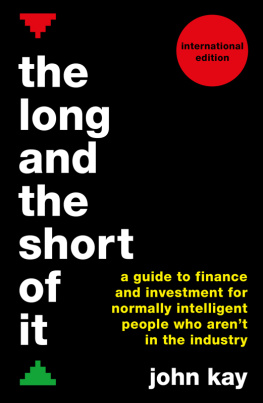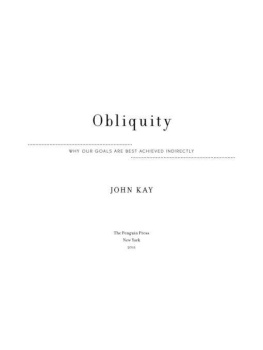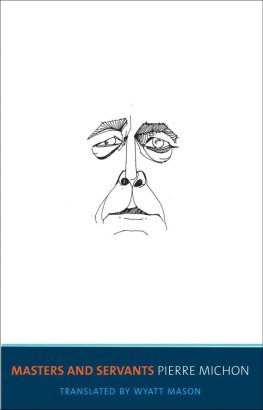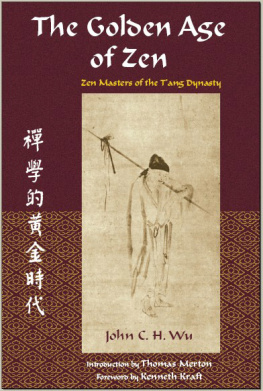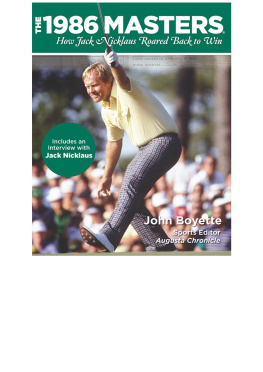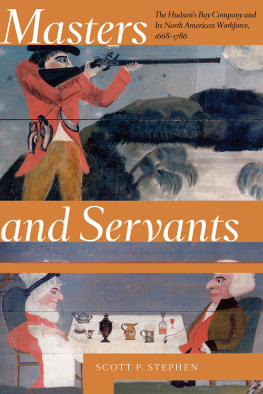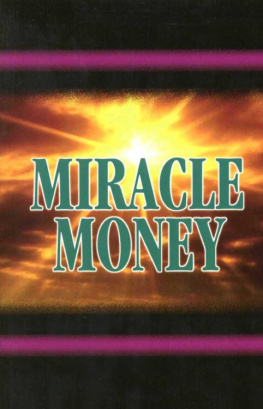John Kay - Other Peoples Money: Masters of the Universe or Servants of the People?
Here you can read online John Kay - Other Peoples Money: Masters of the Universe or Servants of the People? full text of the book (entire story) in english for free. Download pdf and epub, get meaning, cover and reviews about this ebook. year: 2016, publisher: Profile Books, genre: Politics. Description of the work, (preface) as well as reviews are available. Best literature library LitArk.com created for fans of good reading and offers a wide selection of genres:
Romance novel
Science fiction
Adventure
Detective
Science
History
Home and family
Prose
Art
Politics
Computer
Non-fiction
Religion
Business
Children
Humor
Choose a favorite category and find really read worthwhile books. Enjoy immersion in the world of imagination, feel the emotions of the characters or learn something new for yourself, make an fascinating discovery.
Other Peoples Money: Masters of the Universe or Servants of the People?: summary, description and annotation
We offer to read an annotation, description, summary or preface (depends on what the author of the book "Other Peoples Money: Masters of the Universe or Servants of the People?" wrote himself). If you haven't found the necessary information about the book — write in the comments, we will try to find it.
Other Peoples Money: Masters of the Universe or Servants of the People? — read online for free the complete book (whole text) full work
Below is the text of the book, divided by pages. System saving the place of the last page read, allows you to conveniently read the book "Other Peoples Money: Masters of the Universe or Servants of the People?" online for free, without having to search again every time where you left off. Put a bookmark, and you can go to the page where you finished reading at any time.
Font size:
Interval:
Bookmark:
OTHER
PEOPLES
MONEY
JOHN KAY is a visiting professor at the London School of Economics, and a Fellow of St Johns College, Oxford. He is a director of several public companies and contributes a weekly column to the Financial Times. He chaired the UK government review of Equity Markets which reported in 2012, recommending substantial reforms. He is the author of many books, including The Truth about Markets, The Long and the Short of It and Obliquity.
ALSO BY JOHN KAY
Obliquity
The Long and the Short of It
The Truth about Markets
OTHER
PEOPLES
MONEY
MASTERS OF THE UNIVERSE OR
SERVANTS OF THE PEOPLE?
John Kay

First published in Great Britain in 2015 by
PROFILE BOOKS LTD
3 Holford Yard
Bevin Way
London
WC1X 9HD
www.profilebooks.com
Copyright John Kay, 2015
The moral right of the author has been asserted.
All rights reserved. Without limiting the rights under copyright reserved above, no part of this publication may be reproduced, stored or introduced into a retrieval system, or transmitted, in any form or by any means (electronic, mechanical, photocopying, recording or otherwise), without the prior written permission of both the copyright owner and the publisher of this book.
A CIP catalogue record for this book is available from the British Library.
eISBN 978 1 78283 154 9
The directors of such companies, however, being the managers rather of other peoples money than of their own, it cannot well be expected, that they should watch over it with the same anxious vigilance with which the partners in a private copartnery frequently watch over their own Negligence and profusion, therefore, must always prevail, more or less, in the management of the affairs of such a company.
Adam Smith, The Wealth of Nations, 1776
When I speak of high finance as a harmful factor in recent years, I am speaking about a minority which includes the type of individual who speculates with other peoples money and you in Chicago know the kind I refer to.
Franklin D. Roosevelt, US presidential campaign address, Chicago, 14 October 1936
Contents
PROLOGUE
The parable of the ox
In 1906 the great statistician Francis Galton observed a competition to guess the weight of an ox at a country fair. Eight hundred people entered. Galton, being the kind of man he was, ran statistical tests on the numbers. He discovered that the average guess was extremely close to the weight of the ox. This story was told by James Surowiecki, in his entertaining book The Wisdom of Crowds.
Not many people know the events that followed. A few years later, the scales seemed to become less and less reliable. Repairs would be expensive, but the fair organiser had a brilliant idea. Since attendees were so good at guessing the weight of an ox, it was unnecessary to repair the scales. The organiser would simply ask everyone to guess the weight, and take the average of their estimates.
A new problem emerged, however. Once weight-guessing competitions became the rage, some participants tried to cheat. They even tried to get privileged information from the farmer who had bred the ox. But there was fear that, if some people had an edge, others would be reluctant to enter the weight-guessing competition. With few entrants, you could not rely on the wisdom of crowds. The process of weight discovery would be damaged.
So strict regulatory rules were introduced. The farmer was asked to prepare three-monthly bulletins on the development of his ox. These bulletins were posted on the door of the market for everyone to read. If the farmer gave his friends any other information about the beast, that information was also to be posted on the market door. And anyone who entered the competition who had knowledge about the ox that was not available to the world at large would be expelled from the market. In this way the integrity of the weight-guessing process would be maintained.
Professional analysts scrutinised the contents of these regulatory announcements and advised their clients on their implications. They wined and dined farmers; but once the farmers were required to be careful about the information they disclosed, these lunches became less useful. Some smarter analysts realised that understanding the nutrition and health of the ox wasnt that useful anyway. Since the ox was no longer being weighed what mattered were the guesses of the bystanders the key to success lay not in correctly assessing the weight of the ox but in correctly assessing what others would guess. Or what other people would guess others would guess. And so on.
Some people such as old Farmer Buffett claimed that the results of this process were more and more divorced from the realities of ox-rearing. But he was ignored. True, Farmer Buffetts beasts did appear healthy and well fed, and his finances ever more prosperous; but he was a countryman who didnt really understand how markets work.
International bodies were established to define the rules for assessing the weight of the ox. There were two competing standards generally accepted ox-weighing principles, and international ox-weighing standards. But both agreed on one fundamental principle, which followed from the need to eliminate the role of subjective assessment by any individual. The weight of the ox was officially defined as the average of everyones guesses.
One difficulty was that sometimes there were few, or even no, guesses of the weight of the ox. But that problem was soon overcome. Mathematicians from the University of Chicago developed models from which it was possible to estimate what, if there had actually been many guesses as to the weight of the ox, the average of these guesses would have been. No knowledge of animal husbandry was required, only a powerful computer.
By this time, there was a large industry of professional weight-guessers, organisers of weight-guessing competitions and advisers helping people to refine their guesses. Some people suggested that it might be cheaper to repair the scales, but they were derided: why go back to relying on the judgement of a single auctioneer when you could benefit from the aggregated wisdom of so many clever people?
And then the ox died. Amid all this activity, no one had remembered to feed it.
INTRODUCTION
Far too much of a good thing
In the City, they sell and buy. And nobody ever asks them why. But since it contents them to buy and sell, God forgive them, they might as well.
Humbert Wolfe, The Uncelestial City, 1930
Anyone passing the skyscrapers of Wall Street or the City of London and its annexe at Canary Wharf will be impressed by the scale and scope of modern finance. Logos display familiar names such as Citigroup and HSBC. More discreet brass plates identify organisations that do not deal with the general public. The most important headquarters building in the industry, the head office of Goldman Sachs, at 200 West Street in Manhattan, remains anonymous. The premises are lavish, the limousines ubiquitous. Individuals with offices in the executive suites earn more in a month than most people will expect in a lifetime. But what do these people do? To an extent that staggers the imagination, they deal with each other.
The assets of British banks are around 7 trillion four times the aggregate of the yearly income of everyone in the country. The liabilities of these banks are a similar amount. The assets of British banks are five times the liabilities of the British government. But the assets of these banks mostly consist of claims on other banks. Their liabilities are mainly obligations to other financial institutions. Lending to firms and individuals engaged in the production of goods and services which most people would imagine was the principal business of a bank amounts to about 3 per cent of that total (see ).
Next pageFont size:
Interval:
Bookmark:
Similar books «Other Peoples Money: Masters of the Universe or Servants of the People?»
Look at similar books to Other Peoples Money: Masters of the Universe or Servants of the People?. We have selected literature similar in name and meaning in the hope of providing readers with more options to find new, interesting, not yet read works.
Discussion, reviews of the book Other Peoples Money: Masters of the Universe or Servants of the People? and just readers' own opinions. Leave your comments, write what you think about the work, its meaning or the main characters. Specify what exactly you liked and what you didn't like, and why you think so.

